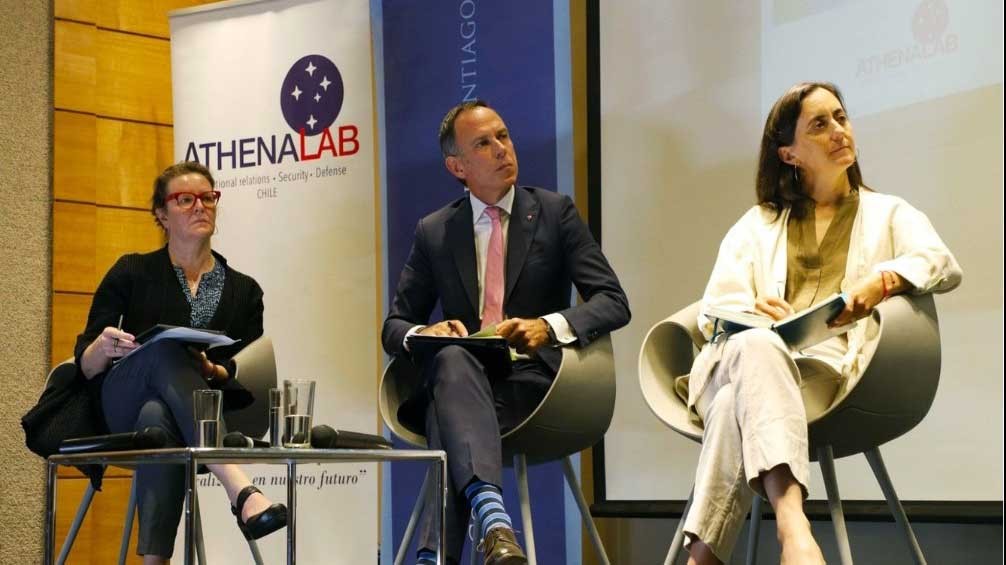Columbia Academics, Experts Discuss Climate Change’s Impact on Latin American Security
The event was part of a PGIF research project led by Page Fortna, Columbia Professor of US Foreign and Security Policy.

At the beginning of March, experts on the environment and security convened in Santiago to discuss how climate change may affect Latin American security.
The event was sponsored by Columbia’s President’s Global Innovation Fund (PGIF), carried out in partnership with the Santiago Center, security-focused NGO AthenaLab, and Columbia’s Saltzman Institute of War and Peace Studies; and convened by the PGIF’s Principle Investigator, Page Fortna, who is Professor of US Foreign and Security Policy at Columbia’s Department of Political Science and a member of the Saltzman Institute.
“Climate Change and Regional Security in Latin America” was opened by Jack Snyder, head of the Saltzman Institute and Professor of International Relations in the Department of Political Science, who said that when it comes to climate change, certain adjustments and sovereign decisions to address it can lead to problems in international relations. He explained that the issue is not only regarding possible wars over water or other scarce resources, but also about indirect impacts on a state such as the phenomenon of migration. "The reality is that this is an intensely political issue, where the sovereignty of states and the tangible material interests of all kinds of social actors are engaged," he noted. Use this link to see Snyder’s full opening remarks.
In the first panel, "Scientific and Political Dialogue on Climate Change in Latin America," chaired by AthenaLab CEO Juan Pablo Toro, the research scientist at Columbia’s Earth Institute, Susana Beatriz Adamo, addressed vulnerability and climate variability in Latin America, as well as migration and demographic change. In turn, Walter Baethgen, Senior Research Scientist at Columbia’s International Research Institute for Climate and Society (IRI), talked about assessing the risks of climate change for Latin America; Francisco Javier Meza, climate change specialist and Professor at Universidad Católica’s School of Agronomy, discussed tendencies and projections on climate change; and Juan Carlos Jobet, Former Minister of Mining and Energy and Distinguished Visiting Fellow at Columbia’s Center on Global Energy Policy (CGEP), reviewed green energy transition and its implications for Latin America.
“If you add up the greenhouse gas emissions of China, the United States and Europe, those three regions are responsible for more than 50% [of the world’s emissions]. All of Africa and South America are responsible for less than 5%,” Baethgen said. “Not all have the same capacities to mitigate the effects” of climate change, which “is not a problem of the distant future, it is happening today and has economic, social and security impacts.”
Use this link to see the video of the first panel.
During the second panel, “Climate Change: Risks and Threats to Regional Security,” chaired by Fortna, Michael Gort, Ambassador of Canada to Chile, spoke of climate change security impacts in Canada; Commander Andrea Cameron, Military Professor at the US Naval War College, addressed climate change as a security variable; Josh Fisher, Director at the Advanced Consortium on Cooperation, Conflict, and Complexity (AC4), Columbia University, talked about climate change as a risk multiplier for intranational and transboundary destabilization; and María Emilia Undurraga, Former Minister of Agriculture, talked about climate change, food security and state resilience.
Vulnerability to climate change varies throughout the world, with local measures permitting states to face global consequences, according to Undurraga. "How do you enable previously unexplored sectors for food production? It's a question that needs to be asked," she said.
Use this link to access the video for the second panel.
The third panel, “Green Defense, Climate Change and Sovereignty,” was chaired by AthenaLab’s Head of Research, John Griffiths and featured Captain Nicolas Pitrat, Colonel Liz Hutchinson, General (ret) Sergio Etchegoyen, and Capitán de Navío Sigfrido Ramírez, all officers from the armed forces of France, the UK, Brazil and Chile, respectively. They addressed their respective countries’ issues in the armed forces and climate change.
According to Hutchinson, climate change will affect operations and tactics, requiring responses to humanitarian and civilian emergencies arising from more extreme environments. In this light, the UK’s armed forces are looking to do their part by cutting down on emissions, such as the case with the Royal Air Force which is using more environmentally friendly fuels, she said.
Use this link to access the full video of the third panel.
In closing, AthenaLab’s Toro made a call for urgent action in environmental stewardship. "Climate change is a threat that needs to be addressed with a sense of urgency. We are already seeing the effects," he said.
Use this link to see the photo album of the event.
Launched in March 2013 by Columbia President Lee C. Bollinger, the President’s Global Innovation Fund offers support for faculty to develop projects and research collaborations within and across the University’s ten Columbia Global Centers, to increase global opportunities for research, teaching, and service.